Commentary
All of the problems that the Chinese Communist Party (CCP) is facing today come from fundamental structural factors that can’t be resolved. This is its biggest crisis.

All of the problems that the Chinese Communist Party (CCP) is facing today come from fundamental structural factors that can’t be resolved. This is its biggest crisis.